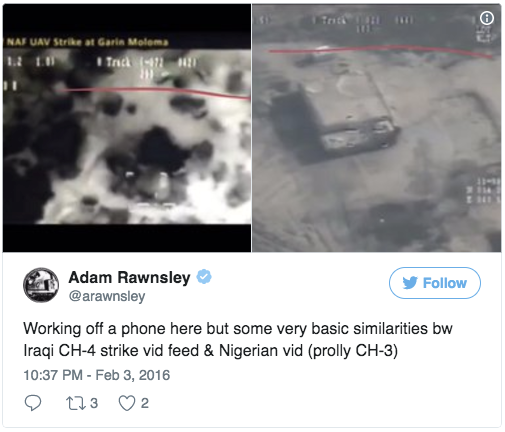Residents of Lake Chad Basin supportive of drones against Boko Haram
Residents of the Lake Chad region view the light presence of drones in their area relatively positively as they associate them with efforts to target the violent extremist organization (VEO) Boko Haram.
They also associate them with certain non-military purposes, according to a recent Navanti survey.
The informal survey, conducted by Navanti Group in April and May 2017, asked residents in three locations in the Lake Chad region — the towns of Maiduguri and Kano in Nigeria, as well as Maroua, Cameroon — about their perceptions on the use of drones in their area. Respondents tended to view drones in a positive light, associating them with filmmaking, nongovernmental organizations, or with the military campaign against Boko Haram.
Different than other locations in the Navanti survey, most respondents in the Lake Chad Basin had not seen unmanned aerial vehicles (UAVs), otherwise known as drones.
Of the respondents who had seen them, the drones were either in the air or parked at the Garoua airport in Cameroon.
The U.S. stepped up its support of the UAV campaign in the Lake Chad Basin in 2015 during a series of intensified military operations by Boko Haram. The VEO had flourished in the remote border regions in the Lake Chad Basin near Nigeria and Cameroon, and had begun not only to attack the Nigerian and Cameroonian military, but also mount devastating suicide attacks against civilians in nearby towns and villages. The U.S. announced in October 2016 that it would send resources to a new drone base in Garoua, Cameroon, near the border with Nigeria, in support of the Nigerian and Cameroonian campaigns against Boko Haram.
Nigeria has been running its own UAV program since at least 2014 as part of its continuing counter-insurgency campaign against Boko Haram, which includes both drone surveillance and airstrikes.
Nigeria announced its first successful drone strike in February 2016, when the Nigerian air force announced it had hit a Boko Haram logistics base, pictured below. Since the U.S. has refused to supply Nigeria drones over to human rights concerns, most of its arsenal are Chinese CH-3s, Israeli Aerostar UAVs, or locally made drones.
Respondents for the survey, who were not supporters of Boko Haram, tended to view these UAV initiatives positively.
>
“The Nigerian military use [drones] for surveillance when entering the bush in search of Boko Haram.”
>
“UAVs are helpful for the Cameroonian army because there are not many soldiers, and the size of the army is not large, so it helps in the army’s strategy against BH.”
While some respondents mentioned fears that Boko Haram was using drones to spy on the Nigerian military, no substantial evidence has emerged to indicate the VEO is using them on a large scale.
Voice of America Hausa released a video in February purporting to show a young Boko Haram member flying a small surveillance drone, of the type that can be purchased abroad commercially.
Residents of the Lake Chad Basin were the least concerned respondents among all other areas surveyed regarding drone airstrikes and did not mention the possibility of inflicting civilian casualties.
This could be attributed to the fact that the drone campaigns targeting Boko Haram operate so remotely that civilian casualties are less of a concern. Another factor could be the vast unpopularity of the VEO, which has raped, killed and tortured tens of thousands of people since 2010.
Several respondents in the survey also viewed drones as a useful tool for filmmaking and aid work in the region.
This could be due to increased use of UAVs in Nigeria by its large film industry, dubbed “Nollywood.” One respondent referenced a recent World Food Programme initiative to use UAVs as a tool to improve disaster response, though the plan has not yet taken root. These respondents agreed that UAVs would be a helpful tool to film or deliver aid to areas that are remote and not easily accessible.
As the situation in the Lake Chad Basin develops, security forces will need to ensure that UAV campaigns remain isolated to the relatively unpopulated areas where Boko Haram thrives.
The lack of civilian casualties is directly tied to the popularity of UAV use in the Lake Chad area. At the same time, the VEO must not be allowed to obtain UAVs on a larger scale, which would threaten security forces’ ability to claim the upper hand in surveillance of the remote region as well as potentially threaten their military operations.
About Navanti
Navanti researches socio-economic and political risk trends using a combination of in-house subject matter experts and hyper-local atmospherics reporting from local researchers in predominantly high-conflict zones across Africa, the Middle East, and Eurasia.


